Graham Reid | | 4 min read
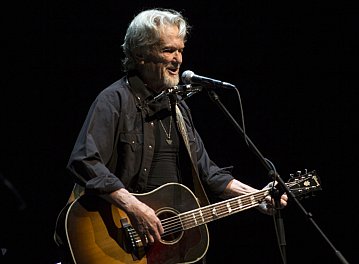
Exactly 20 years ago I heard a song
which changed the way I thought about how a song can be interpreted.
It was at Carnegie Hall and the occasion was the 50th anniversary of the Verve jazz label. On the night an impressive roster of performers rolled out, but one man and one song he sang made such an impression I can hear it even now.
It was Antonio Carlos Jobim and he sang his great Sixties hit The Girl From Ipanema. Jobim was then a frail 67-year old and as it turned out this was, I believe, his last live performance. He died in New York some eight months later.
What struck me about his slow interpretation of that bright bossa tune was that where once the focus of the song might have been on the beautiful woman, now – sung by an old man – it was about aging. The young woman not only looked straight ahead and ignored the singer so smitten with her, but by being sung by an old man there was the recognition that all young women were doing this, and his time was long passed.
The old were invisible to the young.
Songs change by performance, and by the age of the performer.
Much as I enjoy Elvis Costello's still angry treatment of What's So Funny 'Bout Peace Love and Understanding, I prefer Nick Lowe's slower and more world weary interpretation. Costello is raging against the wicked world but Lowe has been eroded and battered by it, and his song is a plea not a shout.
In concert a couple of years ago Paul Simon delivered a similarly sad version of Sounds of Silence. The line “fools said I you do not know” was once full of the cocky certainty of a young man, now the line is a whisper, a hushed acceptance he no longer has that self-confidence after all he's seen.
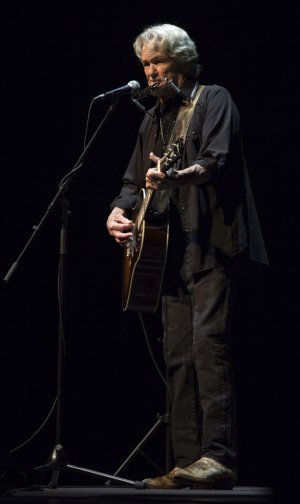 So it is with Kris Kristofferson who in
this (mostly) solo concert – one man, one guitar, a couple of
harmonicas – went through some of his vast back-catalogue and in many of his songs found new dimensions of understanding and meaning,
the wisdom of a man approaching the dimming of the light.
So it is with Kris Kristofferson who in
this (mostly) solo concert – one man, one guitar, a couple of
harmonicas – went through some of his vast back-catalogue and in many of his songs found new dimensions of understanding and meaning,
the wisdom of a man approaching the dimming of the light.
Help Me Make It Through the Night may still be about love, but it is now tempered with despair and need; Nobody Wins is more than just a break-up song of regret but a funereally slow acceptance of all the hurts in life; Please Don't Tell Me How the Story Ends now sounds like a genuine valedictory song from a man whose most recent material includes Feeling Mortal (sung with an almost wry humour).
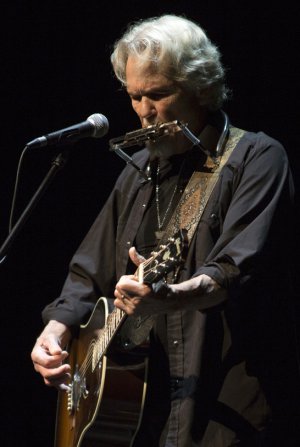 Kristofferson – who turns 78 next
month – is one of the great narrative songwriters who brings a rare
humanity to his stories like Darby's Castle now rendered with more
sympathy than condemnation. An old warhorse like Billy Dee –
written after the death of Janis Joplin – is lifted beyond its era
of the Sixties and the drug casualties which took out some of the
wild ones. Now it sounds more like a farewell to a generation and the
character is an emblem more than an individual. And Duvalier's Dream
now becomes less about the woman who breaks his soul than the tragedy
of his bitterness but the possibility of love she brought.
Kristofferson – who turns 78 next
month – is one of the great narrative songwriters who brings a rare
humanity to his stories like Darby's Castle now rendered with more
sympathy than condemnation. An old warhorse like Billy Dee –
written after the death of Janis Joplin – is lifted beyond its era
of the Sixties and the drug casualties which took out some of the
wild ones. Now it sounds more like a farewell to a generation and the
character is an emblem more than an individual. And Duvalier's Dream
now becomes less about the woman who breaks his soul than the tragedy
of his bitterness but the possibility of love she brought.
But this quiet, personable performance – with his customary fluffed lines and obvious relief at getting through some songs – was hardly a bleak affair.
Kristofferson peppered the show with flashes of humour: he admitted that a song about all the women yet to be won was written a long time ago, told of his five-year old telling him The Silver-Tongued Devil and I was “a bad song” because he wasn't taking responsibility for things he'd done; there was the throwaway Sky King (to tune of Big John) about a butt-puckerin' chopper pilot . . .
With his daughter Kelly joining him for a bracket in the second half, the concert also had even more light and shade.
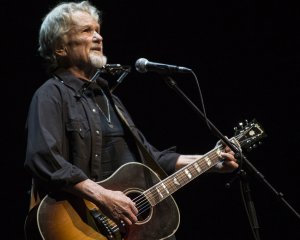 In these spare settings you can also
hear the craftsman at work: Jody and the Kid has a remarkably similar
scansion to Me and Bobby McGee.
In these spare settings you can also
hear the craftsman at work: Jody and the Kid has a remarkably similar
scansion to Me and Bobby McGee.
Women (in various shapes as lover, temptress, saviour and saint) populate Kristofferson's songs, themes of freedom are plentiful, and politics in the broadest sense is often a subtext.
His simple and affecting version of They Killed Him (which he noted Dylan had covered with a children's choir) included a reference to the Kennedys (whom he spoke frequently about in my recent interview with him).
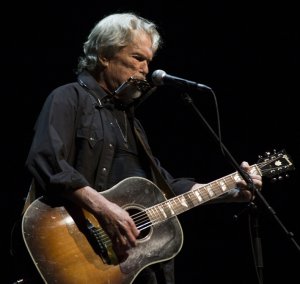 But even among these some songs stood
out. Sunday Morning Coming Down today sounds steeped in sadness and
regret (although the poetry of “someone frying chicken” remains a
remarkably clear image) and For the Good Times is another song where
the need for companionship now supersedes any sexual content the song
contains.
But even among these some songs stood
out. Sunday Morning Coming Down today sounds steeped in sadness and
regret (although the poetry of “someone frying chicken” remains a
remarkably clear image) and For the Good Times is another song where
the need for companionship now supersedes any sexual content the song
contains.
A stately and whispered Loving Her Was Easier was so full of hard-won understanding and given the kind of delivery that perhaps someone, in 20 years time, would say it changed the way they thought about old songs, old singers and how the meaning of a lyric can be shifted by the passage of time.
Elsewhere has two interviews with Kris Kristofferson (2005, 2014) and a number of album reviews here.
Images here by Garry Brandon who has been a concert and commercial photographer for decades in New Zealand. All images copyright Garry Brandon, whose website of archival concert and other work is here.
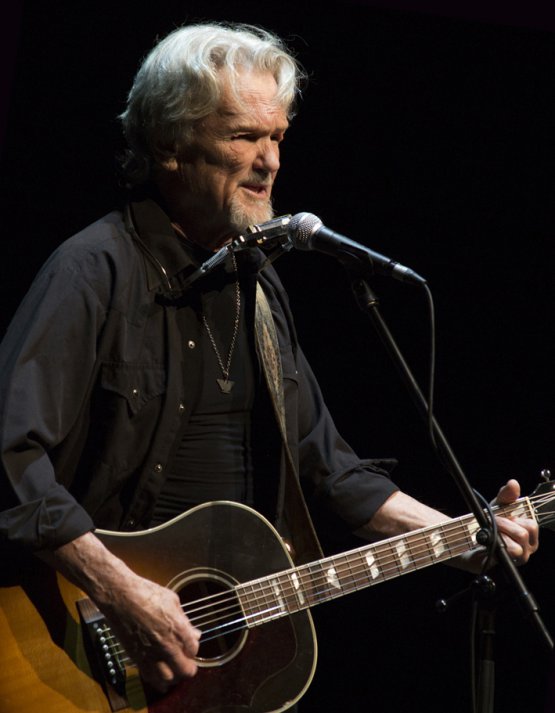
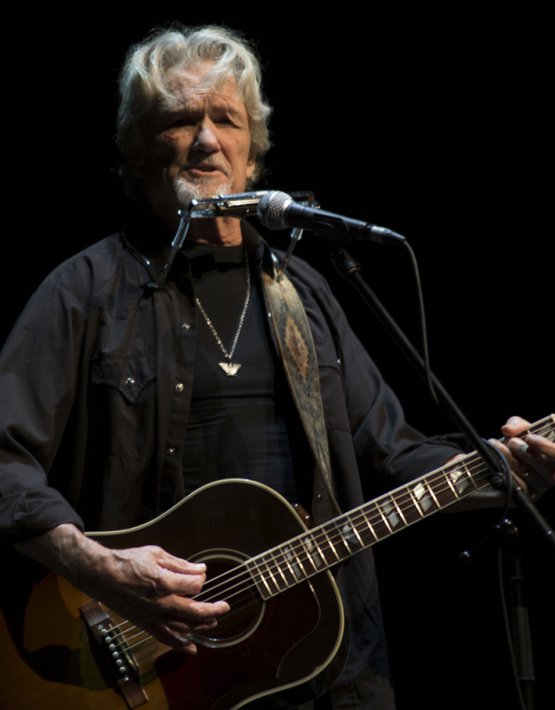



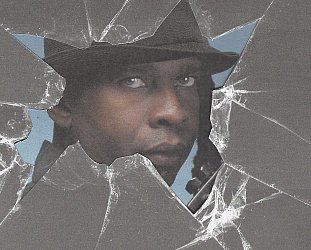

Steve - May 5, 2014
I agree with everything you say- we saw Kris (and Kelly) in Dunedin last Friday night and loved the show. I am playing some vinyl from early 70's right now and I could be back in the Town Hall listening to him - his voice hasn't let him down one bit. Not bad for (a near) octogenarian! My only regret is that he didn't come on stage in John Norman Howard persona and launch into "Watch Closely Now", now that would have brought a tear to my eye! :-)
Savepost a comment